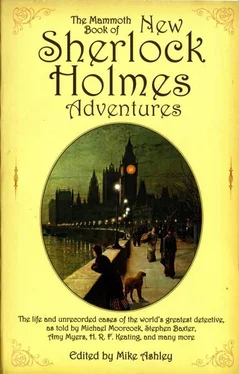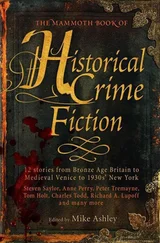Mike Ashley - The Mammoth Book of New Sherlock Holmes Adventures
Здесь есть возможность читать онлайн «Mike Ashley - The Mammoth Book of New Sherlock Holmes Adventures» весь текст электронной книги совершенно бесплатно (целиком полную версию без сокращений). В некоторых случаях можно слушать аудио, скачать через торрент в формате fb2 и присутствует краткое содержание. Жанр: Детектив, на английском языке. Описание произведения, (предисловие) а так же отзывы посетителей доступны на портале библиотеки ЛибКат.
- Название:The Mammoth Book of New Sherlock Holmes Adventures
- Автор:
- Жанр:
- Год:неизвестен
- ISBN:нет данных
- Рейтинг книги:5 / 5. Голосов: 1
-
Избранное:Добавить в избранное
- Отзывы:
-
Ваша оценка:
- 100
- 1
- 2
- 3
- 4
- 5
The Mammoth Book of New Sherlock Holmes Adventures: краткое содержание, описание и аннотация
Предлагаем к чтению аннотацию, описание, краткое содержание или предисловие (зависит от того, что написал сам автор книги «The Mammoth Book of New Sherlock Holmes Adventures»). Если вы не нашли необходимую информацию о книге — напишите в комментариях, мы постараемся отыскать её.
Marianne is an important fictional formulation of Sand's thinking on the role of women and the nature of democracy. This edition includes a long biographical preface which quotes extensively from her correspondences.
The Mammoth Book of New Sherlock Holmes Adventures — читать онлайн бесплатно полную книгу (весь текст) целиком
Ниже представлен текст книги, разбитый по страницам. Система сохранения места последней прочитанной страницы, позволяет с удобством читать онлайн бесплатно книгу «The Mammoth Book of New Sherlock Holmes Adventures», без необходимости каждый раз заново искать на чём Вы остановились. Поставьте закладку, и сможете в любой момент перейти на страницу, на которой закончили чтение.
Интервал:
Закладка:
In his seat beside me, Sherlock Holmes muttered something. Now Mr Porter left the stage, and of a sudden we were plunged into utter darkness.
Without warning, a railway engine burst onto the stage, rushing headlong towards the audience. There was a general panic, followed by gasps and applause as the realization came that this oncoming juggernaut was a kinetographic image in one of Mr Edison's Vitascope films. I confess that I had risen halfway from my seat, in flight from the illusion, before Holmes's grip on my arm restrained me. "Calm yourself, Doctor. It is only a toy."
I regained my seat, and the programme resumed. The next Vitascope was a tableau vivant of several plump ladies striking poses in Grecian robes. This was followed by a display of ocean waves. Next came an extract from the opera Faust – an opera, that is, without music or voices, for I was disappointed to observe that these Vitascope life-studies were devoid of sound and colour. The actors were obliged to perform their roles in dumb-show. Still, they were remarkable – and their silence lent them an air of dignity that speaking actors often lack.
" Ton my word, Watson," Holmes whispered beside me. "This thing is no mere toy. It is marvellous! Long after the actors on that screen have died, their images will still walk and gesticulate for generations yet unborn!"
Now there commenced a low comedy titled Why Mrs Jones Got a Divorce, followed by an even lower melodrama called Ching Lin Foo Outdone. Beside me in the darkness, Holmes writhed in his seat.
"The greatest educational tool ever devised, and this man Edison squanders it on knockabout farces," Holmes remarked in disgust.
Now the picture changed again, to a play titled The Dream of a Rarebit Fiend. On the screen before us, a man wearing a frock-coat was seated at a table, consuming his dinner ofWelsh rarebit. The picture faded momentarily, and at once this same man was in his bedroom, attired in a nightshirt and a peaked nightcap. The transformation was instantaneous, and I did not see how it was done. The nightshirted man clambered into his bed, drew up the counterpane, and went to sleep with remarkable alacrity.
Suddenly the bed rose from its moorings and flew out the window, with its occupant – now awake and terrified – clinging fast to the headboard. The bed flew over the rooftops towards the spire of a church that was surmounted by a weathervane which seemed rather larger than necessary. Here the animated bed ejected its passenger, and flew onwards without him. All about me in the dark of the music-hall, the audience roared with laughter whilst the poor fellow in the nightshirt dangled helplessly from the weathervane, kicking and bellowing. The last scene – with no intervening transition – showed him safe in his bedroom again, wakening from a nightmare. Solemnly raising his right hand and gazing heavenward, whilst moving his lips in dumb-show, the fellow vowed a silent oath: presumably against eating Welsh rarebit at bedtime.
"Watson, this is really quite enough," Sherlock Holmes remarked beside me, amidst the raucous merriment of the audience surrounding us. "Surely, in Manhattan's vasty deeps, we might find entertainment more refined than this. Let us elsewhere ourselves."
The image on the screen had changed once more. Now it depicted an urban crossroads, quite unremarkable excepting that the trams, broughams, and other conveyances – in the American manner – were moving on the wrong side of the street. Upon the screen, men and women were proceeding in their usual fashions and varying gaits, entering at the one side and exeunting at the other. A newsboy hawked his gazettes between two hoardings underneath a street-lamp, and although this object was unlit – the tableau taking place in full daylight – I was surprised to observe that the street-lamp was outfitted for electrical current, not gaslight. Two signs depending from the lamp-post apprised us that this crossroads was the intersection of "Broadway" and "W. 58th Street". In the background, a clock-dial set into the face of a distant tower gave the time as ten-seventeen. Evidently, this newest vitascope film was neither farce nor tragedy, but merely an impromptu vignette of Manhattanites in their native environs… and as such, no especial drama was about to unfold.
"You are right, Holmes," I whispered to my friend. "I have beheld my fill. Let us away to the Empire Theatre, and pay tribute to Miss Adams."
During the while I said these words, the images, on the screen continued their silent processions. As I spoke, yet one more figure made his entrance within the background of the tableau before us. He was a man of above the middle height, thirtyish, with neatly trimmed moustaches. He was well-shod, in expensive cordovans, and clutching in his left hand a furled umbrella. But something about him was out of the common: his pin-striped suit was of a cut which had passed out of fashion some thirty years ago, and he sported side-whiskers in the style called dundrearies, which have long been out of vogue. Suddenly I felt a sharp pain in my wrist: the finger-tips of Sherlock Holmes were pressing into my flesh, as Holmes's body went rigid.
"Watson!" he shouted, so loudly that every person in the theatre might have heard him. "That man on the screen! He is lames Phillimore!"
From the dark rows behind us, someone shouted for Holmes to keep still.
I felt a chill run up my spine as I beheld the flickeringVitascope image. James Phillmore had vanished thirty-one years ago, yet the newcomer on the kinetographic screen looked barely thirty years of age. "You must be mistaken, Holmes," I whispered, so as not to disturb the audience. "If Phillimore is still alive, he is in his sixties now."
"I tell you, Watson, he is the very man!" Holmes stood erect, and pointed his long arm towards the screen. "That man is James Phillimore to the life, and he has not aged a single day since he vanished!"
I think that every head in the audience must have turned towards us at that moment, and every tongue – in harsh American accents – shouted at us to be quiet. Therefore I was certain that no one save Holmes and myself observed what happened next upon the Vitascope's screen.
As if responding to Sherlock Holmes's voice, the man on the screen abruptly turned and looked directly toward us. His eyes widened in delight, and his mouth split into a broad grin. His lips moved silently, in unheard speech.
Holmes leaped forth from his seat. "Down in front!" bellowed some person behind us.
I have said that the man in the picture stood within its background. No longer. Looking directly at Sherlock Holmes, the silent image of James Phillimore strode boldly to the foreground of the image. With a brief sidelong glance before resuming his gaze in Holmes's direction, he traversed West Fifty-Eighth Street, stepped onto the kerb of the near side, and placed his well-shod feet firmly atop the pavement whilst he raised his umbrella, and pointed it squarely at Holmes. Now I too leaped out of my chair.
The other simulacra within the Vitascope screen took no notice of James Phillimore, but continued their own exits and entrances at both sides of the rectangular image. At the centre of the screen, the left hand of James Phillimore silently aimed his umbrella into the audience: directly towards the head of Sherlock Holmes. At the same time, Phillimore raised his right hand to his brow in a sardonic salute.
At that instant, James Phillimore vanished!
There was no question of a trap-door beneath him. With my own eyes, I had seen Mr James Phillimore disappear into thin air. On the Vitascope screen, the people and conveyances of West Fifty-Eighth Street maintained their kinetographic cavalcade, utterly oblivious to the fact that a man had vanished from their midst.
Читать дальшеИнтервал:
Закладка:
Похожие книги на «The Mammoth Book of New Sherlock Holmes Adventures»
Представляем Вашему вниманию похожие книги на «The Mammoth Book of New Sherlock Holmes Adventures» списком для выбора. Мы отобрали схожую по названию и смыслу литературу в надежде предоставить читателям больше вариантов отыскать новые, интересные, ещё непрочитанные произведения.
Обсуждение, отзывы о книге «The Mammoth Book of New Sherlock Holmes Adventures» и просто собственные мнения читателей. Оставьте ваши комментарии, напишите, что Вы думаете о произведении, его смысле или главных героях. Укажите что конкретно понравилось, а что нет, и почему Вы так считаете.












